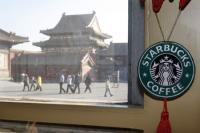From Hong Wang, translated by CDT:
The Forbidden City‘s Jiuqing Chaofang has once again been connected to coffee, as a new cafe has opened at the former site of Starbucks cafe. Seven years ago, when the American Starbucks company opened its coffee shop here, Jiuqing Chaofang became famous. Two months after Starbucks left, the Forbidden City quietly opened its own cafe.
Starbucks coffee shop is gone, the Forbidden City cafe arrives. The glorious Forbidden City is just yesterday’s palace. The cultural complex witnessed the historical origins of the Chinese nation by the rejuvenation of the whole process — this process is the national culture’s beautiful turnaround from rejecting foreign culture to accepting it. Thus, today’s Forbidden City retains the harmony of both the Chinese snuff and the western clock. Earlier, the CCTV anchor Rui Chenggang blogged and protested the existence of Starbucks in the Forbidden City. The whole event raised a hot discussion in China, and even attracted the attention of foreign media. Rui’s point is that he found opening a cafe in the Forbidden City to be in serious conflict with the totem significance of the museum. However, when we just focused on Starbucks while avoiding the conflict between traditional cultural and commercial symbols, the logical basis of the movement to expel the Starbucks became pale and fragile.
The Starbucks dispute is raging fanaticism. The essence is not because we are the enemy of one American brand coffee shop. The real reason is our anxiety at seeing the excessive erosion of our historical and cultural monuments by the commercial symbols. In this sense, Starbucks is the scapegoat.
In fact, what we should discuss is not the problem of what brand coffee the Forbidden City should sell, but the communication problem between traditional culture and commercial capital. From the removal of Starbucks to the sale of the national brand coffee, it once again highlighted the economic and cultural collisions we are facing. And there remains a biased methodology.
First, the event was raised to an unnecessary height, the national level. Second, it often led to the search for emotional value in the inherent experience, and always the results lead to excessive one-sided understanding or interpretation.
I almost forgot one crucial question: “Dear visitors to the Forbidden City, do you care what coffee you drink or what scenes you see at the historical sites?” Consider that our Qing emperors liked to adopt new things and might have drunk coffee. Remember the Qing emperor Kangxi had the German mathematician Leibniz‘s binary calculator in his library? Sooner or later, the commercial capital will have to dialogue with the Chinese traditional culture. Sooner or later consumerism has to enter the heart of traditional culture. In fact, pretending to be very traditional often is not able to protect tradition. If I buy a cup of Starbucks and wander around the Forbidden City, it should not be counted as insulting the culture. [The Original Chinese Report]








